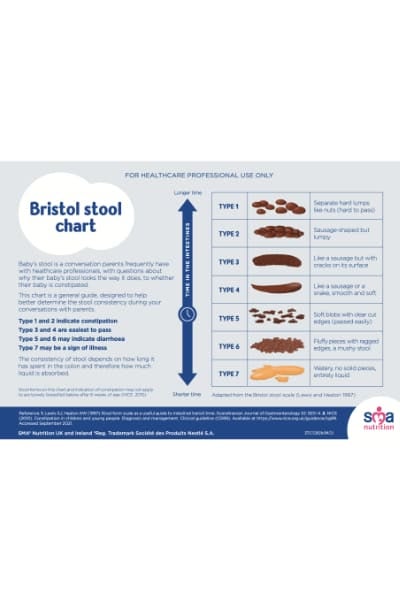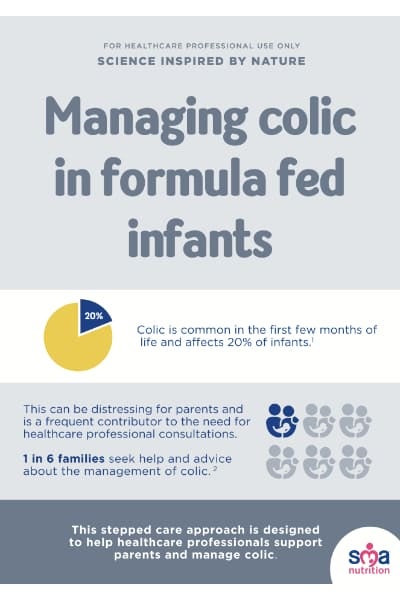Overview
In the first few weeks and months of an infant’s life, mild digestive disorders like colic, constipation, wind or crying are common and can be distressing for parent and baby.1 A newborn may commonly have multiple gastrointestinal symptoms.2
1 in 6 families seek help and advice about managing colic in babies3 and these mild digestive disorders are a frequent contributor to the need for healthcare professional consultations.

Bristol Stool Chart
Download the Bristol stool chart to support your conversations with parents about baby stools and constipation.

Managing colic in formula fed infants
Download an infographic for help with managing colic in formula fed babies
Identifying Colic
Infantile colic is a self-limiting condition which is defined clinically as repeated episodes of excessive and inconsolable crying in an infant that otherwise appears to be healthy and thriving4
Rome IV Diagnostic criteria for infantile Colic5
- An infant aged <5 months when the symptoms start and stop
- Recurrent and prolonged periods of crying, fussing or irritability reported by parents (caregivers) that occur without obvious cause and cannot be prevented or resolved by parents or caregivers
- No evidence of infant faltering growth, fever or illness
For more information on the causes, remedies, management of infant colic click here.
Identifying Constipation
Rome IV Diagnostic criteria for functional constipation5
Must include 1 month of at least two of the following in infants up to four years of age:
- Two or fewer stools per week
- History of excessive stool retention
- History of painful or hard bowel movements
- History of large diameter stools
- Presence of a large faecal mass in the rectum
- Other signs may include, amongst others: excessive wind, soiling or overflow, distention or discomfort6
For advice on managing constipation, click here
For formula fed babies with colic or constipation, the new SMA® Comfort offers a unique combination of ingredients specifically designed for the dietary management of colic and constipation. Find out more.
Baby symptom tracker
Use the link below to download our baby symptom tracker
This 24-hour diary for symptoms is designed to aid parents / caregivers in keeping track of baby’s symptoms when the baby has feeding issues or crying-related symptoms. Using this tracker to keep an accurate record of a baby’s symptoms / events and sharing it with a healthcare professional may help with accurate diagnosis.
Download the helpsheet for parents



